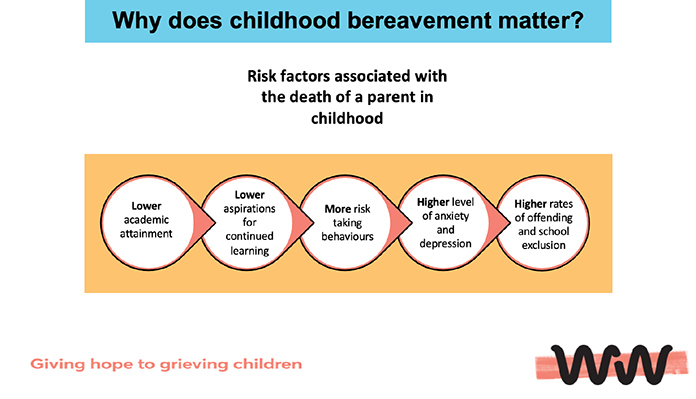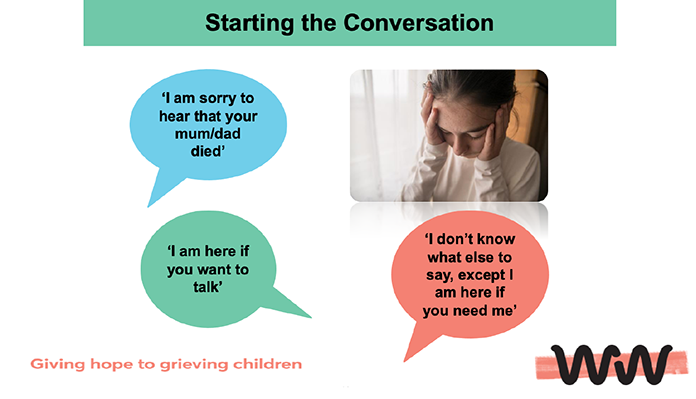
As part of the latest webinar in our CYP sharing and learning series, we welcomed Kerry Khosa from Winston’s Wish to discuss how best to support bereaved children and young people. Kerry is a training practitioner, children’s counsellor and clinical supervisor.
Winston’s Wish is a childhood bereavement charity, the UK’s first of its kind. They offer practical support and guidance to bereaved children and their families, as well as providing training and information for professionals. Today, Winston’s Wish is a primarily digital service. With all of their services delivered online, they can reach and support thousands of CYP each year, all across the UK.
If you would like to catch up on the webinar, you can view the full recording here. You can also view the presentation slides below.
How mental health professionals might best support grieving children and young people:
There is a clear need for effective support for bereaved children and young people. Every 22 minutes, a child’s parent dies in the UK. Furthermore, 480,000 children under the age of 18 have experienced the death of a parent or sibling, which equates to 4% of children. Every child should be able to get the support they need, at a time when they need it the most.
Factors that influence how a child is impacted by a death

Many factors affect how a child is impacted by a death, and these need to be considered when supporting bereaved children and young people:
- The cause of the death will impact how they process grief and their ability to make sense of it. If it is more complicated to understand what has happened, grief can become more traumatic and risk factors can arise. However, it is important to understand that no matter the cause, all deaths can be detrimental and traumatic.
- The relationship the child had to the person who has died.
- Timing – other things happening at the same time can impact grief. The emotional health of others around the child is important – all family members may also be grieving, so might not be emotionally available to provide support.
- The family set up – how does the child’s family react to grief overall? Are they open or not? This determines the child’s ability to deal with grief in a healthy way. If their family is open, they will be more likely to feel supported and feel able to talk about it, whereas, if their family is not open, the child may feel like they can’t talk about it, which may heighten the grief / cause them to bottle up their feelings.
- Consider the child themselves – the developmental stage that they are at, as well as whether they have previously had any trauma or difficult childhood experiences can influence how they will respond to grief.
Remember: grief is a very unique thing. Each child or young person will grieve differently, at a different pace. Taking a holistic approach and considering all available factors when providing support will enable them to be the most out of it.
What is the impact of bereavement on a child?
Not all impacts of bereavement are causes for concern. However, clinicians need to understand how best to support bereaved children through it. Acceptance that the grieving process takes time; there is no exact amount of time that heals it.
Some of the main impacts that may arise can include:
- Anxiety about what happened, or about the past and/or the future.
- Fears and anxieties or challenging nightmares can cause sleep difficulties.
- Anger – a sense of injustice around losing a loved one can cause the young person to become angry.
- Concentration difficulties – grief can significantly impact thought processes, making concentration and retaining information very difficult. This means the young person’s brain may not have the capacity to support them at work or school.
- Physical complaints – young people may often mention physical difficulties that they are experiencing following the death of a loved one. This is normally a method for them to express their grief, which can be considered a sign that the young person is in need of additional support.
How can you support a bereaved child?

When considering the best ways to support a bereaved child, bear in mind that the worst has already happened, so you are unlikely to make them feel any worse.
- Have the confidence to say something to them. It is crucial to acknowledge the death and help the child to understand where they can go to get support.
- Provide them with age appropriate information. Be open and honest to allow the child to process all the associated emotions and feelings.
- Address their fears and anxieties. Validate their feelings, allow them to express them, and then you can consider the right approach to help them through it. Be a trusted adult that they know they can speak to.
- Within the school community, there is lots that schools can do. You can work closely with the families, as well as providing a safe space for them to express their emotions.
Supporting bereaved neurodivergent children or those with SEND

Considering and supporting bereaved children with additional needs is very important. There is often a misconception that neurodivergent children and young people may not be able to fully understand what is happening when a death occurs. This leads to them often not being given all of the information surrounding what happened. If a child has SEND, the nature of this may make it more difficult for them to understand the full meaning of death. They may also struggle a lot with how to manage the change that this causes to their life.
To support them most appropriately, you should aim to understand their preferred communication methods. This can then enable you to be creative with methods to help them cope and process grief differently, for example, through storyboards.
How can Winston’s Wish provide support?
Throughout her talk, Kerry highlighted how Winston’s Wish can help support bereaved children and young people. They offer a national helpline, email service and live chat. Support can be provided immediately on demand, one to one support or counselling via Zoom, or via grief support groups.
You can also find out more about training for professionals here.
For more resources on how to support children and young people’s mental health, or to sign up for future webinars, explore our Mayden Hub.
